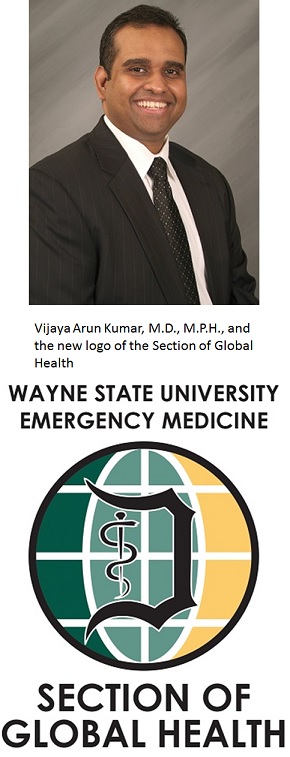
Vijaya Arun Kumar, M.D., M.P.H., assistant professor of the Wayne State University Department of Emergency Medicine and associate director of the department's Global Health Section, has been awarded the 2017-2018 WSU Educational Development Grant to establish a new collaborative effort between the Department of Emergency Medicine and the Division of Infectious Diseases.
The collaboration will lead to increased interdepartmental lectures for residents and fellows, and will assist in the development of a Global Health certificate program that is being established through the collaborative efforts of multiple departments. The Division of Infectious Diseases and the Global Health section faculty will be involved with creating course material and educational series for the certificate program.
The $4,000 grant will also aid in the development of a travel handbook that will be used by the School of Medicine's World Health Student Organization, residents, fellows and faculty during travel to international sites. Medical students involved in the WHSO send groups to impoverished countries for a week at a time to provide health care, often in makeshift clinics.
The goal, Dr. Kumar said, is to help transition an environment of fragmented curricular development to one of increased collaboration, and an emergence of best practices and shared models. The Global Health section will work with Pranatharthi Chandrasekar, M.D., professor of Internal Medicine and chief of Infectious Diseases, in this collaborative effort.
The Global Health certification program is designed for residents entering their second year of residency, students enrolled in the master's of public health degree program and faculty interested in global health. The program complements the graduate students' departmental requirements by offering courses that provide a comprehensive understanding of global health conditions, needs and solutions.
"This will be an interdepartmental effort involving collaboration between Emergency Medicine, Infectious Diseases, Internal Medicine, Family Medicine and Public Health Sciences, Pediatrics, Obstetrics and Gynecology and Surgery," Dr. Kumar said.
The two-year program, housed in the Department of Emergency Medicine's Section of Global Health under the directorship of Kristiana Kaufmann, M.D., M.P.H., clinical assistant professor, will cover critical issues in global health, including, but not limited to, understanding the global burden of disease, health systems management, multi-sectoral partnerships, interdepartmental dynamics, treatment algorithms specific to the health care setting, evidence-based policy making, and project design, monitoring and evaluation of sustainability. The course will involve both didactic sessions and projects during rotation at any of the School of Medicine's affiliated health care sites.
"As an area for study, research and practice, global health emphasizes translational health issues, synthesizing population-based prevention with evidenced-based, community-supported initiatives," Dr. Kumar said. "There presently is no structured course for training of medical students and faculty who are interested in making global health trips at Wayne State University. Creating a global health curriculum, along with development of handbook, will immensely increase enthusiasm and will also improve recruitment efforts for future medical students and residents."
Recent work by experts, he said, emphasizes that education in globally-relevant health issues should form a basis of contemporary health professions' education. "This program is especially designed to equip participants with the foundational knowledge and skills necessary to function and flourish in global health practice, whether at home or abroad, in a wide variety of settings."
Educational Development Grants can be used for a variety of teaching-related experiences, including the application of new technologies in the teaching of specific courses, the development of new techniques to enhance instruction, to enrich resource materials, to provide new learning experiences in specific courses and programs, and the development of new courses to support new programs or new areas of study.